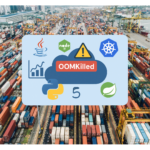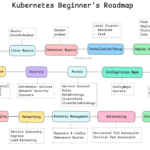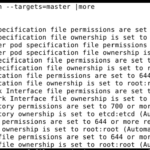Prometheus has become the de facto standard for monitoring Kubernetes environments, with over 90% of Cloud Native Computing Foundation members adopting it for their observability needs. Detecting and resolving issues before they impact users requires robust monitoring systems that can handle the dynamic nature of containerized applications. Kubernetes environments present unique monitoring challenges due to […]
kubernetes
Kubernetes Security Best Practices: Battle-Tested Pod Protection Methods
Recent studies paint a concerning picture of Kubernetes security. A 2023 report in InfoSecurity Magazine reveals that security breaches affect 59% of organizations using Kubernetes. IBM’s research shows the average cost of data breaches hit $4.88 million in 2022, making Kubernetes security practices more significant than ever. Kubernetes now powers critical business applications and handles […]
OOMKilled in Kubernetes: The Hidden Memory Leaks You’re Missing
Your Kubernetes pods might suddenly die, and you might find they were OOMKilled. These frustrating terminations can happen even with plenty of free memory on your nodes. The Linux kernel’s unique memory management behavior causes this problem. A Kubernetes exit code 137 signals that the OOM Killer has terminated a process. Several factors trigger this […]
Kubernetes Roadmap for Beginners
Kubernetes (K8s) is a powerful open-source platform for automating the deployment, scaling, and management of containerized applications. It helps orchestrate containers across a cluster of machines, ensuring high availability, scalability, and fault tolerance. This roadmap will guide you through the essential steps to start your Kubernetes journey. Why Learn Kubernetes? • Container Orchestration: Manage containers […]
How to Pass the CKS Exam: Questions and Answers You Need to Know
The Certified Kubernetes Security Specialist (CKS) certification is a highly regarded credential designed for professionals who want to demonstrate their expertise in securing Kubernetes environments. The certification is provided by the Cloud Native Computing Foundation (CNCF) in collaboration with The Linux Foundation. Key Aspects of the CKS Certification: 1. Target Audience: 2. Skills Validated: 3. […]
How to patch kubernetes existing deployment? How to roll back?
Patching a Kubernetes deployment involves making updates or changes to an existing deployment. This can be useful for various reasons, such as fixing bugs, applying security updates, introducing new features, or making configuration changes. Kubernetes provides several mechanisms to patch deployments, and the choice depends on the nature of the changes you want to make. […]
k8s Certs – How to validate private key and TLS certificate?
In a Kubernetes cluster, certificates are crucial for securing communication between various components. For example, a Kube API server certificate secures communication between the Kubernetes API server and other components. It is used for authenticating and authorizing API requests. This article will help you to validate your private key and certificate. Sometimes, we would miss […]
How to renew Kubernetes expired certificates?
How do you renew the kubernetes expired certificate? Kubernetes uses various certificates for secure communication within the cluster. These certificates are essential for securing communication between various components, such as API servers, kubelets, and etcd. Environment: root@kmaster1:~# kubectl version –shortClient Version: v1.22.0Server Version: v1.22.15root@kmaster1:~# Here are some of the important certificates used in Kubernetes: How […]
How do you create a first helm chart? Kubernetes Package Manager
Helm is a package manager for Kubernetes that allows you to define, install, and upgrade even the most complex Kubernetes applications. Helm is one of the most vital tools in DevOps. Kustomize is a built-in tool for Kubernetes that allows you to customize raw, template-free YAML files for multiple purposes, including managing multiple versions of […]
kubectl – Let’s colourize the output
kubectl is a command-line tool for interacting with Kubernetes clusters. It is the primary interface for managing and controlling Kubernetes clusters, including deploying applications, inspecting cluster resources, scaling workloads, debugging, and performing various administrative tasks. kubecolor is an alternative command-line tool to interact with kubernetes clusters and provide the colorized output, unlike the kubectl command. […]









